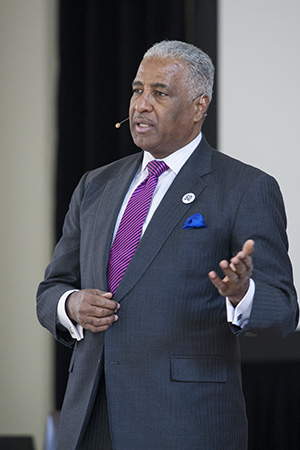
Birmingham mayor William Bell told Samford University students that civil rights changes in the city came about because many different people came together to make it happen.
It is hard to imagine situations such as the hatred that led to the 16th Street Baptist Church bombing that killed four young girls in September, 1963, acknowledged Bell.
"But because good men and women said that could not happen, things changed," said Bell, adding that civil rights, like human rights, is not just about skin color, but also gender, nationality and disability.
Bell, speaking to a convocation audience in Reid Chapel Thursday, Feb. 21, discussed the "50 Years Forward" campaign currently underway to recognize the civil rights events that took place in Birmingham in 1963.
"We must look 50 years forward and see who we can inspire today. Recognizing our past sets the platform to give inspiration to other places where they think they can't make a change," said Bell, noting that many nations continue to struggle with basic human rights issues.
While it is hard to imagine 1963 Birmingham, with its discrimination in public transportation, education and career opportunities, "when your dreams cannot come true because of the color of your skin," many individuals bravely took up the challenge to force change, said Bell.
Civil rights leaders such as Rev. Fred Shuttlesworth suffered beatings and other retaliation from Birmingham police offers under direction of public safety commissioner Bull Conner. College students who led petition drives and organized marches were targeted with fire hoses and imprisoned with large bail amounts.
"Students had nothing to lose. Their parents would lose jobs, but the students weren't working," said Bell. Plus, civil rights organizers thought nobody would hurt students who just wanted justice. "But, they were wrong."
He told how Dr. Martin Luther King's imprisonment in April, 1963, prompted his famous "Letter from Birmingham Jail" in response to seven clergy who asked him to leave town and let citizens work on civil rights problems. In his letter, Bell said, King essentially said, "If not now, when? You must face these injustices as they stand now."
The tumultuous events in Birmingham also inspired the civil rights movement to expand to the national stage with the August, 1963 March on Washington, D.C. The event became the venue for King's historic "I Have a Dream" speech, which is also said to connect to his Birmingham experience.
Bell noted that in 1963 he had no idea he would be the first African-American to attend John Carroll High School or to serve as president of the city council. Nor did Birmingham native Condoleezza Rice, also an African-American, know she would become an advisor to a U.S. president, head of national security or U.S. secretary of state.
Those and many other possibilities are all a direct result of the bravery of people who stood up and said they couldn't allow injustices, he said.
Bell was elected mayor in 2010 after service on the the Jefferson County Commission and the city council. He was introduced at the convocation by Samford associate athletics director and Birmingham city council member Jay Roberson.
Bell's talk was part of a series of Black History Month and related events at Samford during February. Roberson and chemistry professor Dr. Denise Gregory are coordinators of the series.
